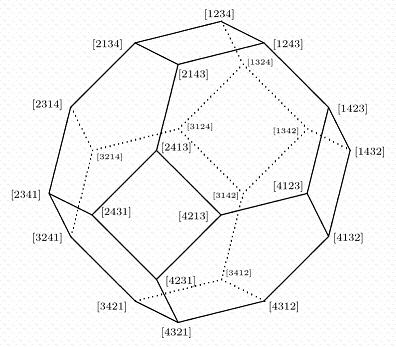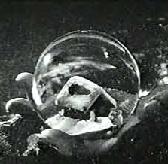At Luisa's Mexican Restaurant . . .
Click image for the source.
" … Had they deceived us
Or deceived themselves, the quiet-voiced elders,
Bequeathing us merely a receipt for deceit?"
— Four Quartets
Log24 posts of 9/11, 2013 —
Those who enjoy lead balloons may
consult also Zeppelin in this journal.
The conclusion of yesterday’s commentary on the May 30-31 Pennsylvania Lottery numbers:
Thomas Pynchon, Gravity’s Rainbow:
“The fear balloons again inside his brain. It will not be kept down with a simple Fuck You…. A smell, a forbidden room, at the bottom edge of his memory. He can’t see it, can’t make it out. Doesn’t want to. It is allied with the Worst Thing.
He knows what the smell has to be: though according to these papers it would have been too early for it, though he has never come across any of the stuff among the daytime coordinates of his life, still, down here, back here in the warm dark, among early shapes where the clocks and calendars don’t mean too much, he knows that’s what haunting him now will prove to be the smell of Imipolex G.
Then there’s this recent dream he is afraid of having again. He was in his old room, back home. A summer afternoon of lilacs and bees and
286”
What are we to make of this enigmatic 286? (No fair peeking at page 287.)
One possible meaning, given The Archivist‘s claim that “existence is infinitely cross-referenced”–
Page 286 of Ernest G. Schachtel, Metamorphosis: On the Conflict of Human Development and the Psychology of Creativity (first published in 1959), Hillsdale NJ and London, The Analytic Press, 2001 (chapter– “On Memory and Childhood Amnesia”):
“Both Freud and Proust speak of the autobiographical [my italics] memory, and it is only with regard to this memory that the striking phenomenon of childhood amnesia and the less obvious difficulty of recovering any past experience may be observed.”
The concluding “summer afternoon of lilacs and bees” suggests that 286 may also be a chance allusion to the golden afternoon of Disney’s Alice in Wonderland. (Cf. St. Sarah’s Day, 2008)
Some may find the Disney afternoon charming; others may see it as yet another of Paul Simon’s dreaded cartoon graveyards.
More tastefully, there is poem 286 in the 1919 Oxford Book of English Verse– “Love.”
For a midrash on this poem, see Simone Weil, who became acquainted with the poem by chance:
“I always prefer saying chance rather than Providence.”
— Simone Weil, letter of about May 15, 1942
Weil’s brother André might prefer Providence (source of the Bulletin of the American Mathematical Society.)
 (Photo from Providence)
(Photo from Providence)

For more on the mathematical significance of this figure, see (for instance) Happy Birthday, Hassler Whitney, and Combinatorics of Coxeter Groups, by Anders Björner and Francesco Brenti, Graduate Texts in Mathematics, vol. 231, Springer, New York, 2005.
This book is reviewed in the current issue (July 2008) of the above-mentioned Providence Bulletin.
The review in the Bulletin discusses reflection groups in continuous spaces.
Sequel to previous 4 entries:
A Christmas Carol
by Dylan Thomas
Current phase of the moon,
from the U.S. Naval Observatory:
|
|
 |
 |
And I remember that we went singing carols once, a night or two before Christmas Eve, when there wasn’t the shaving of a moon to light the secret, white-flying streets. At the end of a long road was a drive that led to a large house, and we stumbled up the darkness of the drive that night, each one of us afraid, each one holding a stone in his hand in case, and all of us too brave to say a word. The wind made through the drive-trees noises as of old and unpleasant and maybe web-footed men wheezing in caves. We reached the black bulk of the house.
‘What shall we give them?’ Dan whispered.
‘”Hark the Herald”? ‘‘Christmas comes but Once a Year”?’
‘No,’ Jack said: ‘We’ll sing “Good King Wenceslas.” I’ll count three.’
One, two, three, and we began to sing, our voices high and seemingly distant in the snow-felted darkness round the house that was occupied by nobody we knew. We stood close together, near the dark door.
Good King Wenceslas looked out
On the Feast of Stephen.
And then a small, dry voice, like the voice of someone who has not spoken for a long time, suddenly joined our singing: a small, dry voice from the other side of the door: a small, dry voice through the keyhole. And when we stopped running we were outside our house; the front room was lovely and bright; the gramophone was playing; we saw the red and white balloons hanging from the gas-bracket; uncles and aunts sat by the fire; I thought I smelt our supper being fried in the kitchen. Everything was good again, and Christmas shone through all the familiar town.
‘Perhaps it was a ghost,’ Jim said.
‘Perhaps it was trolls,’ Dan said, who was always reading.
‘Let’s go in and see if there’s any jelly left,’ Jack said. And we did that.

Powered by WordPress